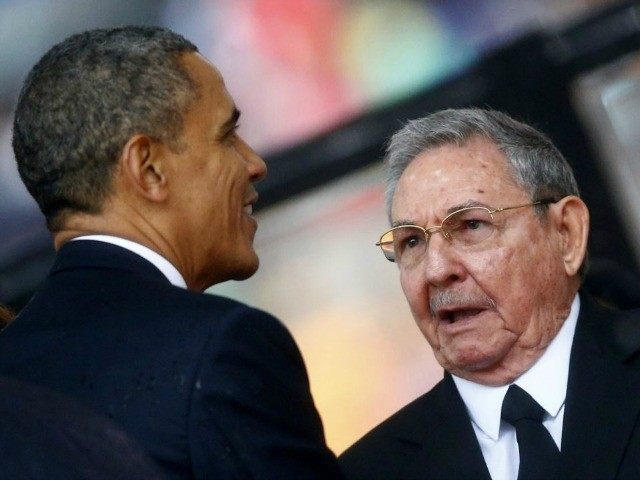Last week, the White House promised that President Barack Obama would engage in an “interaction” with Cuban dictator Raúl Castro at the Summit of the Americas. The summit begins officially Friday, and more details have surfaced on what that interaction will entail: the two leaders, who shared a phone conversation Thursday night, will share the stage at the summit Friday.
The news of President Obama and Castro sharing a stage has taken the spotlight overnight from violent attacks by Cuban officials on dissidents invited to attend the conference, occurring in broad daylight in Panama and caught on video. President Obama has not remarked on these attacks.
Reuters reports that both will be on the same stage, alongside other North and South American leaders, to discuss issues on the international docket. That public diplomatic display follows a meeting between U.S. Secretary of State John Kerry and Cuban Foreign Minister Bruno Rodríguez, which went on for two hours in a room with a large soundproof glass window. The conversation was described by U.S. officials as “lengthy and very constructive.”
No details about the phone call between President Obama and Castro have been released. The Associated Press notes that media learned of the call through a Facebook post by Cuban National Information Agency Deputy Director Jorge Leganoa. An anonymous diplomat confirmed the call to the AP.
NBC News is heralding the White House for the symbolic meeting, a first since President Obama announced major concessions to the Castro regime in December. NBC notes that the last time the heads of state of both nations had a conversation in person, the men filling those roles were President Dwight D. Eisenhower and democratically elected Cuban President Fulgencio Batista. The last American president to visit Cuba, NBC adds, was Calvin Coolidge in 1928.
President Obama is not expected to discuss the Cuban government’s widespread and overt use of violence, nor its support of terrorism, with Castro. On the contrary, reports suggest that President Obama may discuss removing Cuba from the State Department’s State Sponsors of Terrorism list, despite Cuba’s support for the Revolutionary Armed Forces of Colombia, the ETA, and Hezbollah.
This is the first year that the Cuban government has been invited to the Summit of the Americas, despite the summit’s rules that only democracies are allowed to attend. Organizers also invited prominent members of the dissident community to participate in the summit, as a way to highlight the voices of former political prisoners, political activists, and diverse pro-democracy groups.
While the summit begins Friday, the Cuban government’s harassment and assault of these dissidents began as soon as they walked off their planes in Panama City. Cuban dissident Rosa María Paya was arrested upon landing in Panama for the conference and was threatened by Cuban intelligence agents to be silent at the conference or face consequences.
Cuban and Venezuelan representatives refused to participate in the Summit’s Civil Society Conference on Thursday, as well, due to the presence of dissidents from both countries. This resulted in a chaotic scene where representatives from other countries who had not taken a side in the dissident issue were prevented from entering the conference floor and participating in the event.
The Panamanian government has since apologized to Payá for her arrest, though it has apparently done little to prevent subsequent disorder caused by Cuban agents. That fact became clear on Wednesday when a group of Cuban dissidents attempted to place flowers at a bust of Cuban independence hero José Martí at a park in Panama. Cuban government representatives arrived on location and began punching and kicking the dissidents, despite the clear presence of multiple cameras. Many of the dissidents, including 17-year prisoner of conscience Jorge Luis García Pérez, can be seen in the video with swollen faces and other injuries.
Neither President Obama nor the State Department has commented on the attacks, and President Obama has yet to discuss the fate of Cuban dissidents under an emboldened Castro regime in the months following his economic and political concessions to Castro.
In addition to the violence against dissidents within its borders, in recent years, Cuba has escalated its support for terrorist activity, a fact the State Department has not yet specifically addressed. The Cuban government has been complicit for some years in an Iranian-Venezuelan operation meant to provide Hezbollah terrorists with easier access to the United States and Canada. According to a report by the Secure Free Society, Cuba has been helping Venezuela falsify passports for various Iranian nationals to allow them to travel more freely in the Western Hemisphere. Venezuela alone is accused of issuing at least 173 passports, visas, and permits to Islamist radicals with Cuba’s assistance.

COMMENTS
Please let us know if you're having issues with commenting.